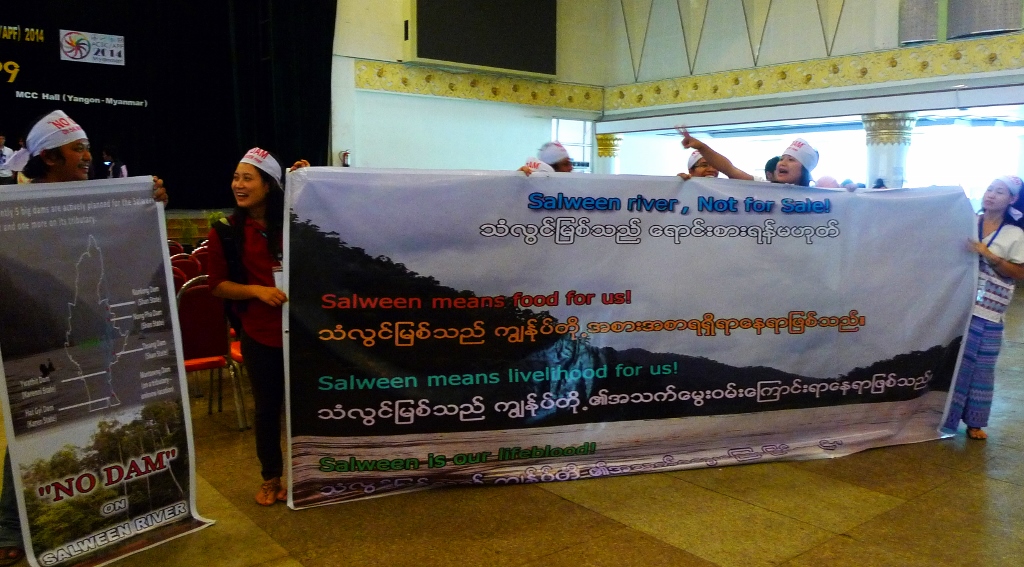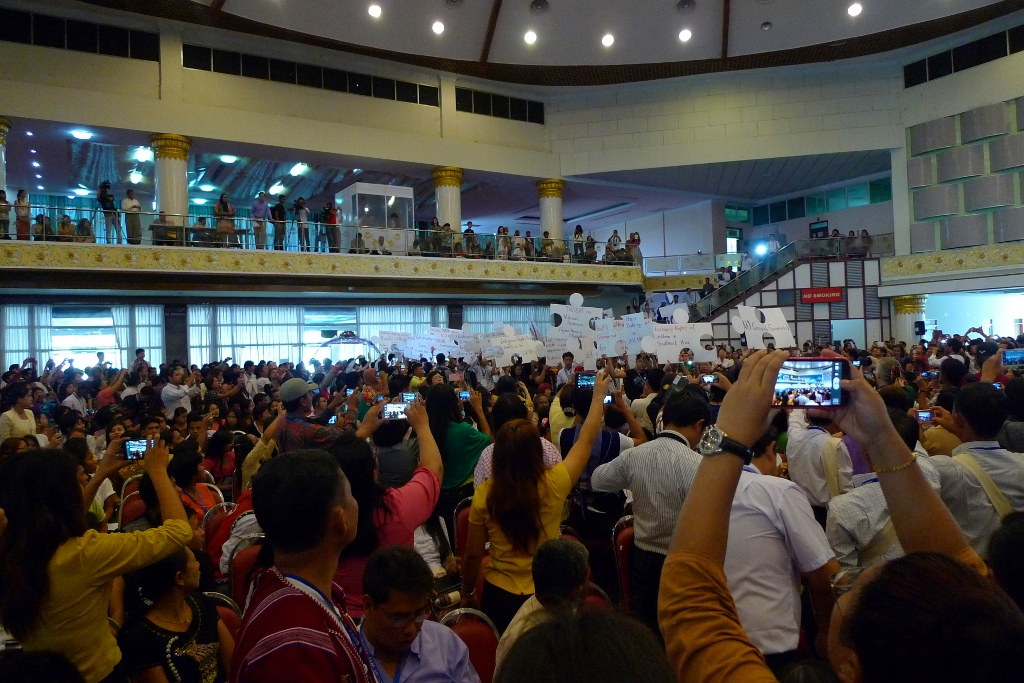What can ASEAN do? ASEAN People’s Forum recommends ASEAN adopt “environment” pillar

Leading up to the 2014 ASEAN Summit,[1] the ASEAN People’s Forum (APF) was held in Yangon, Myanmar from 21-23 March 2014.[2] The APF is an independent meeting parallel to the summit, and this year it was a venue for large plenary presentations alongside the 35 workshops on issues of critical importance for the region.
By day three over 3000 participants—including individuals from non-government organizations, embassies, youth, independent civil society members, researchers, and academics—had registered. This exceeded the organizer’s 1200 person aim and represents the largest turnout since APF’s inception in 2005. The overwhelming interest also fuelled conversation and enthusiasm throughout the meeting.
As a forum participant conducting research on transboundary environmental issues, the statements and issues raised in workshops posed significant counterpoints to the standard notions of development and transboundary cooperation under the so-called “ASEAN Way.”[3]
The ASEAN Way can be described as a kind of regional cooperation which seeks to avoid conflict by privileging state sovereignty or national interest. Within this approach, questions remain regarding what role civil society can play or advocate for, and if national governments are the best representative of environmental issues in a system that has primarily emphasized the acceleration and expansion of regional economic development.
One of the most anticipated outcomes of the APF is the “People’s Declaration,” a set of recommendations that are made to the leaders meeting for the ASEAN Summit.[4] An important component of the 2014 recommendations include the call for an additional environment pillar.[5]
Environmental concerns were raised within the APF’s workshop session titled “Investment in Myanmar: Repetitive Experiences with Other ASEAN Countries? Challenging for Peace and Self-determination of Local Communities.” Participants discussed how to contend with ASEAN’s policy of non-interference in cases of transboundary development and investment. Presentations focused on, for instance, the Dawei Special Economic Zone and the Shwe Gas Pipeline, both proposed in Myanmar but with environmental and social impacts to and investment from Thailand.
At the end of this session, the moderator summarized what many of the individual presenters had highlighted, mainly that “We need to regulate across borders. We need a fourth environment pillar for ASEAN.”[6]
While ASEAN has taken a proactive role in promoting regional energy development, achieving sustainable growth requires the capacity to evaluate and respond to impacts that cross national borders. My research will evaluate the opportunities for cross-border strategic environmental assessment (SEA), and investigate the barriers and challenges to its widespread implementation in ASEAN. As part of on-going research, I will be examining cases of transboundary energy development, such as Dawei.

An important component of this research includes analysis of the policy discussions and demonstrations that take place at regional meetings, such as the APF or the ASEAN Summit. Instead of solely focusing on interviews with government delegates or policy documents, I focus on the gaps and interactions embodied in these meetings in order to better understand the negotiations and contestations by and among ASEAN civil societies and governments over pressing environmental issues which cross national borders.
——- [1] This year the ASEAN Summit will be held in Naypyidaw, Myanmar from 9-11 May 2014. [2] While I use “APF” the full name is the ASEAN Civil Society Conference/ASEAN People’s Forum (ACSC/APF). [3] For discussion of the ASEAN Way, see also: Ke, Jian and Qi Gao. 2013. Only One Mekong: Developing Transboundary EIA Procedures of Mekong River Basin, Pace Environmental Law Review 30(3). http://digitalcommons.pace.edu/pelr/vol30/iss3/3 Acharya, Amitav. 2001. Constructing a Security Community in Southeast Asia: ASEAN and the Problem of Regional Order. Routledge. [4] The declaration in full: http://aseanpeople.org/wp-content/uploads/2014/03/Official-Statement-of-ACSCAPF-2014.docx [5] The three existing ASEAN pillars include: political and security cooperation, economic cooperation, and socio-cultural cooperation. [6] Quoted from transcript of workshop March 22, 2015.
This blog post has been written by Vanessa Lamb. Vanessa is a Post-doctoral Associate at the York Centre for Asian Research (YCAR) in Toronto, and Junior Fellow (2013-2014) under the ASEAN-Canada Research Partnership. For more information on the ASEAN-Canada Research Partnership, please click here.



